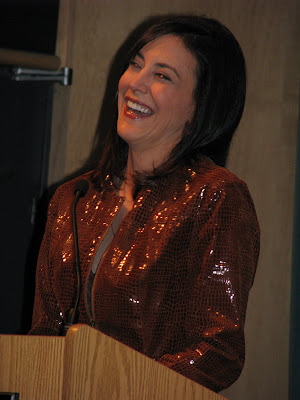Since the magazine is published in Springfield, I treat this like a local story and I learn so much about an industry of which I was once part. I'm thinking of trying to do either a podcast or my own show on blogtalk radio (see below).

Michael Harrison is the publisher of Talkers and a guy who I think is a true media visionary

Stephanie Miller emceed part of the proceeding and was hilarious. She was also pretty stunning in a mini-dress suit thingy. Don't worry I'm not sexually harassing her. She actually encourages such talk.

Thom Hartmann is probabaly the most knowledgable guy on talk radio. he's a great Constitutional scholar.

Ed Schultz has the most listeners of any progressive or liberal radio host.
NEW YORK CITY – Although radio as a medium may be struggling with decreased advertising sales and shrinking listeners, the executives, station owners and talk shows hosts gathered at the 11th Annual Talkers Magazine New Media Seminar were upbeat about the future.
Sean Hannity, one of the top-rated nationally syndicated talk shows hosts, said the spoken word format would be the “savior of AM and FM radio.”
“Talkers Magazine” is the trade paper for the talk radio industry, which has grown in the past 20 years from 200 stations to now about 3,000. Longmeadow resident Michael Harrison publishes the magazine from his Springfield office.
Hannity pointed out that “every car in 2009 will have an iPod connection,” which will mean more and more people will program their own music rather than turn to radio. What continues to draw people to talk radio, he explained, is current events.
“If there is a huge news story people turn to us,” Hannity said.
Several speakers returned to a common theme: What talk radio must do to grow the format is to embrace all of the technological platforms people now use for news and entertainment.
Liz Dolan and her sisters recently took their syndicated program “The Satellite Sisters” off of conventional radio and went strictly to a podcast format available on their Web site. Podcasts are recordings that can be downloaded to a computer or an MP3 player such as an iPod.
Dolan was part of a panel on Internet talk and she said her biggest problem was attracting too many sponsors to the new show and format. Proctor & Gamble has signed the sisters up to provide content for the company’s Web
site and Dolan said what advertisers are looking for are the connections the talk radio format makes with listeners.
Long-time talk show host Roberta Gale broadcasts exclusively through a podcast on www.podjockey.com and predicted that advances in technology will soon allow near instant downloading of podcasts.
The success of podcasting isn’t about technology, though, “it’s all about content,” she added.
Alan Levy, who runs www.blogtalkradio.com, said that Internet broadcasting is “democratizing the medium.” His Web site has been operating for the past 18 months and by May had attracted 3.2 million listeners.
The upcoming presidential race was the subject of many comments during the seminar’s “talk rumble,” in which a panel of hosts was asked to comment on questions posed by Alan Colmes. Although the liberal and conservative members of the panel clashed on many topics, they seemed to all agree with smiles and laughs that Sen. Hilary Clinton’s candidacy provided
them with great material.
Predictably, the conservative members of the group all predicted that Sen. John McCain would win the presidential election.
Another panel illustrated another divide in the industry, only this was not about politics but about race. A group of African-American broadcasters spoke about the disparities that many black hosts face from being on stations with low wattage to national advertisers ignoring their ratings.
The discussion was often times charged with emotion as one of the panelists, the Rev. Jesse Lee Peterson, claimed the remarks made by the others hosts were tempered with the attitude that they wanted special treatment.
Talk show host Michael Medved delivered the conference’s annual address on freedom of speech and said that conservative talk show hosts should be more interested in changing listeners’ minds rather than maintaining
“ideological purity.”
“The biggest threat to freedom of speech is conservative political correctness,” Medved said. He added there is a “herd mentality” among many conservative hosts.
“Any political movement that becomes obsessed with purity is a movement in decline,” he said.
Medved also welcomed the growing popularity of liberal or progressive talk programs that add to the spectrum of political discussion.
Rather than reject contrary opinions, Medved urged his fellow hosts to use discussion and persuasion to build “ a real American majority.”
© 2008 by Gordon Michael Dobbs

1 comment:
You should begin a podcast show immediately. You should have me as one of your guests.
Post a Comment